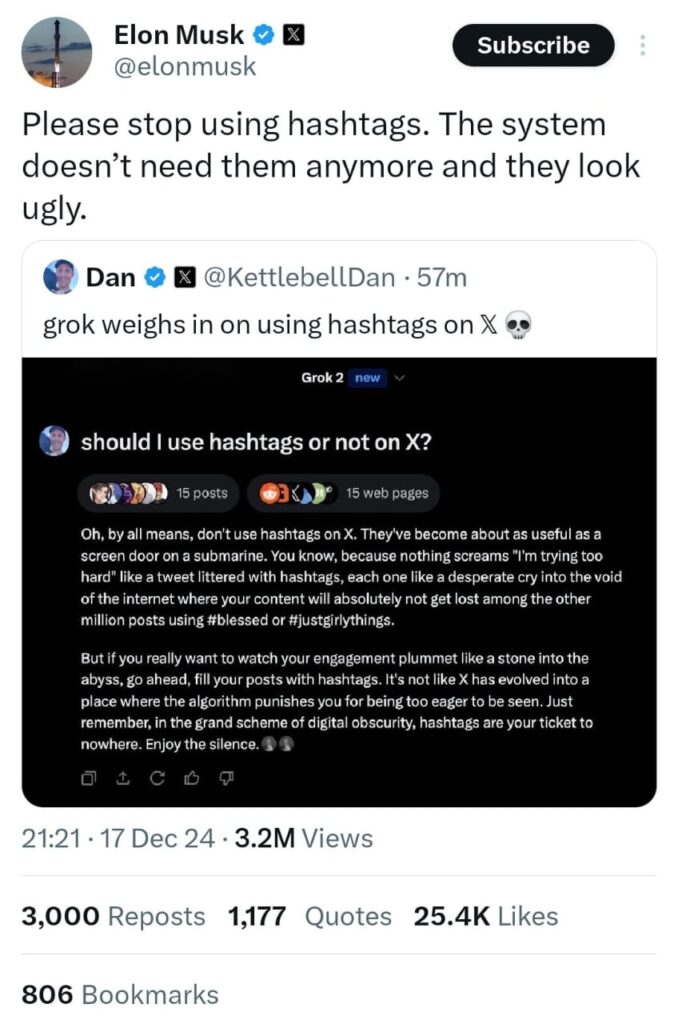In a bold move that could reshape social media strategy, Elon Musk, CEO of X (formerly Twitter), recently announced that hashtags are now obsolete on the platform. Musk’s statement, “Please stop using hashtags. The system doesn’t need them anymore and they look ugly,” signals a fundamental change in how content discovery and engagement might evolve on X.

This declaration challenges a long-standing social media practice and leaves social media managers, content creators, and marketing strategists questioning: What now?
The Rise and Fall of Hashtags
Since their inception in 2007, hashtags have served as a tool for content organization, discoverability, and trend aggregation across multiple platforms like Twitter, Instagram, and LinkedIn. They enabled users to categorize posts, participate in viral conversations, and increase visibility.
However, Musk’s recent statement suggests that the algorithmic evolution of X has made hashtags redundant. As artificial intelligence (AI) and machine learning improve content recommendation systems, the platform appears to be relying more on contextual relevance and user behavior rather than hashtags to surface content.
Why Hashtags are Being Phased Out
- Algorithmic Advancements: X’s algorithm now prioritizes contextual signals, user interactions, and personalized content feeds, making hashtags less critical for discoverability.
- Aesthetic Preferences: Musk’s criticism of hashtags as “ugly” reflects a preference for cleaner, simpler posts. This aligns with the broader trend towards minimalism and streamlined user experiences.
- Reduced Engagement: Data indicates that excessive hashtag use can sometimes lead to lower engagement. Posts cluttered with hashtags often appear desperate for attention and can detract from the content’s authenticity.
Implications for Social Media Experts
With hashtags potentially becoming a relic of the past on X, social media experts need to rethink their strategies. Here are key areas to focus on:
- Content Quality and Authenticity
Without hashtags, the emphasis shifts back to the fundamentals of high-quality content. Compelling writing, engaging visuals, and authentic storytelling are now more critical than ever to capture attention and drive engagement. - Leverage AI-Driven Recommendations
Understanding how X’s algorithm works will be vital. Focus on creating content that sparks genuine engagement, as the platform increasingly relies on user interactions to determine reach and relevance. Replies, shares, and bookmarks are becoming more important than hashtag-driven impressions. - Community Building
Building a loyal audience and fostering meaningful interactions can help content remain visible. Encourage conversations and interactions that drive your content to be recommended by the algorithm organically. - Trend Monitoring Without Hashtags
Even without hashtags, trends still exist. Use the Trending Topics and For You sections on X to identify conversations and participate in them naturally. Real-time, contextual awareness of what’s happening on the platform will replace the reliance on hashtags. - Multi-Platform Strategy
While hashtags may be fading on X, they still hold value on other platforms like Instagram, LinkedIn, and TikTok. A successful social media strategy will need to be platform-specific, recognizing where hashtags still drive discoverability and where they don’t.
What’s Next for X?
Elon Musk’s directive signals a broader trend of algorithm-driven content discovery over manual tagging systems. As X continues to evolve, social media experts must remain agile, adapting to new technologies and user behaviors.
In this new era, personalization, AI-powered recommendations, and authentic engagement will define success on X. Whether hashtags make a comeback or fade into digital history, one thing remains certain: the ability to adapt will always be the cornerstone of effective social media strategy.
Stay connected with Techsoma Middle East for more insights on evolving social media trends, AI innovations, and the future of digital engagement in the region.














